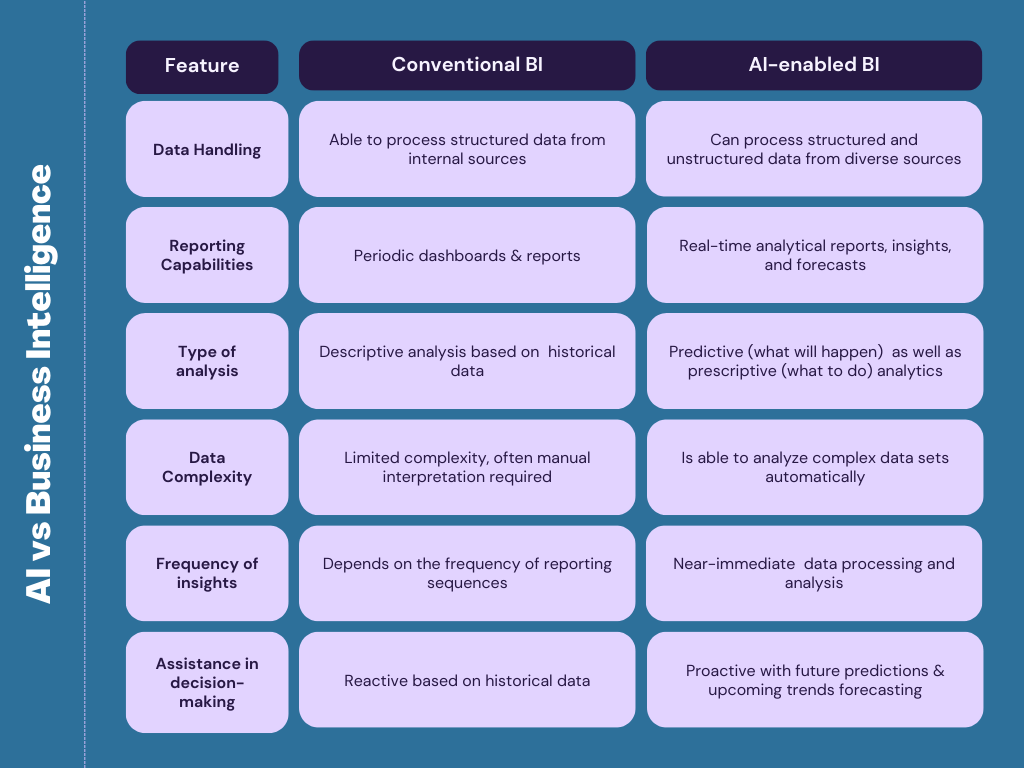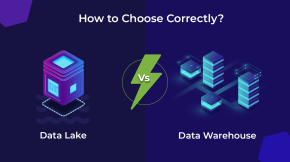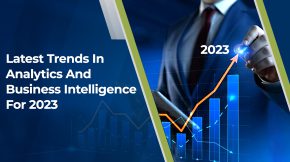The Exciting Future of AI in Business Intelligence
Business intelligence (BI) has been crucial for data-driven decision-making for decades. But quick evolution of artificial intelligence (AI) is set to take BI to the next level.
In this blog, I will talk about the crucial convergence of BI and AI. A transformation that holds the key to unlocking immense value through data. As a technology leader, it’s vital for you to grasp how AI in business intelligence is reshaping.
Let’s get started!
The Evolution of Business Intelligence
Business intelligence refers to the processes, tools, and techniques organizations use to collect, analyze, and extract actionable insights from data. It empowers decision-makers with deep visibility into business operations.
BI has evolved tremendously over the past few decades:
BI 1.0 – Focused on retrospective data analysis through basic reporting and dashboards. Excel spreadsheets were the tool of choice.
BI 2.0 – Saw the rise of BI software platforms like Tableau, QlikView, and Microsoft Power BI, which made analytics self-service. Users could easily visualize and explore data on their own.
BI 3.0 – Incorporates big data sources and real-time analytics through data lakes and streaming data pipelines.
BI 4.0 – The next frontier where AI enhances and augments analytical capabilities to make BI systems smarter. This is where the most disruption is underway.
Today, BI is indispensable for running every function of an enterprise – from finance and sales to HR and operations. It helps monitor performance, track issues, identify opportunities, and guide executive decision-making through data-driven insights.
An Overview of Artificial Intelligence
In parallel, AI has grown tremendously thanks to exponential growth in computing power, the availability of big data, and innovations in deep learning algorithms.
AI broadly refers to the simulation of human intelligence in machines. It focuses on building systems capable of performing tasks that would otherwise require human cognition.
Within AI, machine learning has appeared as the most prominent capability for real-world business applications. It allows systems to learn from data automatically and improve their performance without explicit programming.
Machine learning models detect patterns in vast datasets to make predictions or take actions. Instead of hard coding software routines, ML models are ‘trained’ on large volumes of data to learn rules autonomously.
Thanks to leaps in AI research, ML adoption is exploding. AI could add a staggering $25.6 trillion to the world’s economy. AI is remaking every industry, from finance to healthcare.
Artificial Intelligence vs Conventional Business Intelligence
Traditional business intelligence lets humans analyze data to get numbers and make decisions faster. But it has limits. Artificial intelligence takes business intelligence to the next level.
AI uses special computer programs to actually make data-driven decisions on its own, without human help. It studies tons of data and teaches itself to spot patterns. This gives it ability to predict future outcomes with high accuracy. AI has no biases or gaps that humans do.
Old methods of analyzing data feel outdated compared to AI. AI gives businesses cutting-edge predictive abilities. It looks at current data and makes best guesses about what will happen next. AI also recommends the top actions to take to get optimal results.
While normal BI was good in the past, AI represents the future. It allows businesses to tap into data in revolutionary new ways.

The Convergence of AI and BI
The scopes of AI and BI are now intertwining, giving rise to more intelligent BI capabilities. The integration of the two domains promises to push the envelope on developing ‘smart’ data-driven organizations.
Let’s explore some tangible ways AI is poised to disrupt BI:
Natural language querying– AI-powered natural language processing (NLP) allows users to query data through intuitive text or voice inputs. For instance, they can simply ask, “What were the average sales in October?” instead of constructing queries. Voice-enabled analytics is gaining steam.
Automated insights – ML algorithms can automatically highlight key trends, exceptions, root causes, and forecast values in reports. This reduces the burden on humans to manually analyze massive datasets.
Smart visualization – Based on a user’s past usage patterns and preferences, AI in business intelligence can auto-generate relevant visualizations and recommendations instead of generic dashboards.
Predictive analytics – Advanced ML models enable sophisticated what-if analysis, simulations, predictive modeling, and prescriptive recommendations. They allow forecasting future scenarios.
Lower barriers – Automating data prep, model building, and pipeline creation using AutoML lowers the skills needed to leverage analytics. Citizens can leverage BI embedded with AI.
AI-powered business intelligence is making BI systems more intuitive, proactive, and intelligent.
Key Challenges with AI in Business Intelligence
While the potential of business intelligence AI is alluring, it’s important to acknowledge the challenges it presents. Here are some key issues organizations need to navigate:
- Getting access to voluminous training data.
- Difficulty in integrating AI within existing BI architecture.
- Lack of skills to deploy and maintain AI models operationally.
- Interpreting black box machine learning models that lack transparency.
- Cultural resistance from BI users unwilling to trust predictions from “machines”.
- Hidden biases in data that get amplified through AI, leading to untrustworthy results.
- Governance risks from increased automation and lack of human oversight.
These challenges underscore why a holistic approach is necessary to tap into the potential of AI in business intelligence while minimizing disruptive risks.
The Future of AI-Powered Decision Making
Looking ahead, here are some ways AI-driven decision-making is likely to evolve:
- Ubiquitous conversational analytics using chatbots, voice and natural language as the primary human-data interaction mechanism.
- Hyper-personalization of data experiences with AI tailoring insights and interfaces dynamically for each user.
- Mainstream adoption of predictive analytics, simulation and optimization through no-code ML automation.
- End-to-end ML automation of data analysis workflows with humans in the loop to train and monitor AI systems.
- AI assumes complete ownership of certain automated decisions and processes with human supervision.
- Development of “AI digital twins” that create interactive simulated versions of the real world for scenario testing.
- Evolution of “ethical AI” governance practices to reduce risks and biases through techniques like AI audits.
Applications of AI in Business Intelligence
Let me walk you through some real-world examples of AI you can start applying today:
Streamlining HR functions:
Hiring new resources is a pain, right? Sifting through a mound of resumes tries your patience! But have no fear, AI is here to help. Clever little algorithms can scan those resumes and pick out the star candidates before you even finish your morning coffee. Now that’s what I call a time saver! Chatbots can even screen applicants and AI video tools detect who’ll be a top performer. Let the robots do the grunt work so you can focus on what matters.
Forecasting financial trends:
Money matters, and you want the inside scoop on how to get more of it! AI predictive systems can analyze reams of financial data and news to detect money-making opportunities before you can bat an eye. Think you can beat them? Not a chance! Just ask Wall Street – AI algorithms help make the big wins.
Improving manufacturing operations:
We all hate it when things break down unexpectedly. One minute your factory line is humming along, the next you’re scrambling to fix a busted machine! But AI predictive tools can sniff out problems before they happen by finding hidden signals in equipment data. ThyssenKrupp uses this to spot elevator issues before riders get stuck between floors. Now that’s smart! AI helps you stay smooth and efficient.
Enhancing student experiences:
Students get bored and overwhelmed with one-size-fits-all teaching. But AI tutors jazz up the classroom by tailoring lessons to each kid’s needs! Finally, learning that’s engaging. Colleges like MIT use AI tutors to answer questions and explain tough topics until students get it. I wish they had AI when we were cramming for exams!
Fraud detection:
Looks like fraudsters are trying to scam you again! How do they sleep at night? Not to worry, your AI fraud-busting buddy is on the case. It can analyze billions of transactions to uncover sketchy activity and sound the fraud alarm before any funny business costs you big bucks. See why you got to get you some of that AI?
Text Analytics for Sentiment Analysis:
Here’s the deal — scanning customer reviews and tweets to get inside their heads is no Sunday stroll. But AI text analytics tools can analyze this stuff quick to understand how clients really feel. It’s like having a focus group the size of a small country! Now you can fix problems quicker and make customers happier than ever.
Image Recognition for Product Analysis:
Scanning multiple websites and social media photos to find your products gives us all a headache! But picture this – AI can zoom through those images in a flash and instantly spot your product. Now it’s easy to see where your product’s popping up and track the competition. No more squinting and guessing for you!
See what I mean? AI is already changing the game across industries. And it can help you connect with customers and make smarter moves too.
Beyond Key Unlocks the Power of AI for Business Intelligence
Today’s data-driven world demands more than just traditional BI solutions. Beyond Key recognizes this, and we are at the forefront of integrating cutting-edge AI into our BI consulting services.
Our solutions have been successfully implemented in industries such as healthcare, finance, retail, demonstrating our expertise and relevance in diverse sectors.
Beyond Key helps transform raw data into:
- Hyper-Accurate Forecasts
- Predictive Maintenance
- Intelligent Customer Churn Prevention
- Personalized Marketing Magic
Our team of seasoned BI consultants and AI specialists help you unlock the full potential of your data.
We offer a comprehensive suite of AI-powered BI services, including:
- AI Strategy Development
- Data Preprocessing and Engineering
- Advanced Analytics with AI
- Interactive Dashboards and Reporting
When you partner with Beyond Key, you get:
- Faster Time to Value
- Actionable Insights
- Future-Proofed Solutions
Don’t settle for the status quo. Embrace the power of AI in Business Intelligence with Beyond Key. Contact us today and unlock the true potential of your data.
Now, Here’s the Deal
The possibilities are endless once artificial intelligence becomes deeply integrated into business intelligence architecture. As a technology leader, you must begin the journey today or risk being left behind.
Evaluate use cases where machine learning can give your business intelligence a competitive advantage. Build a roadmap to infuse AI and business intelligence in a phased manner—partner with BI experts who can help you navigate this transformation smoothly. Invest in building responsible and trustworthy AI systems with humans at the center.
See here how AI can elevate your existing decision-making to create immense value. Lead your organization to the forefront of next-generation analytics. The time for change is now!





















